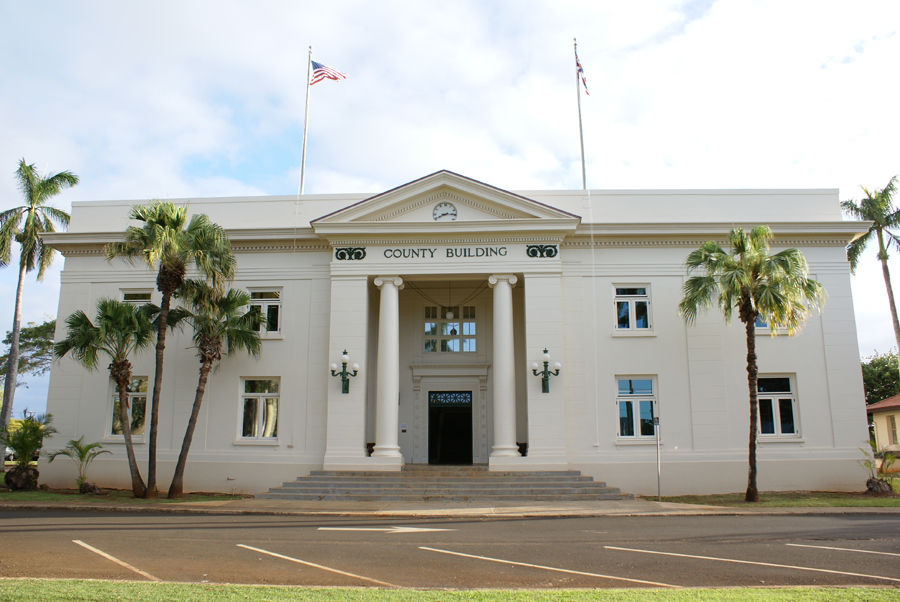LIHUE — An increase of the General Excise Tax will not be imposed on Kauai residents. In a 4-3 vote Wednesday, the Kauai County Council voted against a bill that would have increased the 4 percent GET by a quarter
LIHUE — An increase of the General Excise Tax will not be imposed on Kauai residents.
In a 4-3 vote Wednesday, the Kauai County Council voted against a bill that would have increased the 4 percent GET by a quarter of a percent.
Councilmen KipuKai Kuali’i, Gary Hooser, Ross Kagawa and Mel Rapozo voted no.
“The more discussion we have, and the more I hear about the tax, the more sure I am in my vote,” Kuali’i said. “The families are taking the bullet for the county’s inability to budget properly, and as I see it, we’re stopping the bullet.”
It would be wrong to create a new tax, he added.
“We shouldn’t get in the business of GET,” he said.
Bill 2610 was an effort to fund $100 million worth of backlogged road repairs over 10 years.
In 2015, the Legislature granted counties the right to establish a one-half percent surcharge on the GET. Counties have until July 1 to enact an ordinance that would increase the tax from Jan. 1, 2018 to Dec. 31, 2027.
Kuali’i also pointed out that the administration found money for employee raises, but couldn’t find money for road repairs.
“It’s horrible we’re in this position when we just raised salaries,” he said.
Kagawa agreed.
“When it comes to salary increases, there’s no problem finding funds, and when it comes to road beautification, we find the funds,” he said. “But when it comes to fixing roads and bridges, we tell people we’ll tax them to get the roads fixed.”
During public comment, Nancy Ka’ana and Lalani Menduro spoke in favor of the GET.
“The roads are eroding, and it will be 17 years before we can get them back to normal,” she said. “I’m willing to pay an extra quarter if it will repair our roads and transportation system.”
Menduro said her mother relies on the bus system.
“She uses the bus to go the doctor, and sometimes it’s late,” she said. “I’m in support of the GET because it will provide better transportation.”
During the discussion, Councilman Mason Chock, whose silence during a roll call vote was recorded as an affirmative, proposed a GET hike of .01 percent.
Because the council has until June 30 to pass the GET hike, Chock’s proposal, if approved, ensured the GET could be increased in 2018, when it would officially go into effect.
“It’s a compromise to look at in the future,” he said. “I don’t want to have to support it, but it’s about what we can do to solve the issue.”
In response, Councilwoman JoAnn Yukimura, who voted for the GET increase with Councilmen Arryl Kaneshiro, proposed to increase the GET 1/8 of a percent instead of a quarter percent.
“It cuts the existing bill in half,” she said. “It’s a more realistic figure, but acknowledges concern for the tax increase and the need for money.”
But the percentage is irrelevant because it’s up to the next council, in 2018, to set the GET increase, Rapozo said.
In the end, both GET amendments were rejected.
Raising the GET is a matter of being responsible, Kaneshiro said.
“No one wants to pay taxes, but do we have the responsibility to do something about the roads? I believe so,” he said.
Yukimura added: “It’s a viable option, and it disappears if we don’t seize the opportunity. Otherwise, we give it to our children.”
The median income for families on Kauai is $70,000, which equals to about $15 a month, she added, for the GET hike.
“That’s three lattes. We can sacrifice three lattes to expand transit,” she said.
But Rapozo said most families cannot afford regular coffee, much less lattes.
“I’m not going to support this because it’s unfair to our citizens,” he said.
The county is in the position of looking to raise the GET because the Legislature capped the Transient Accommodation Tax, he added.
One alternative to the GET is using the visitor industry, Hooser said.
“The source of the issue is the TAT, so let’s use it as a tool to fix it,” he said.
While the county cannot raise the TAT, it can raise property taxes on resorts and car rental operations. Which in effect, raises the GET, Hooser said.
“It would send a huge message to the Legislature that we can play hardball,” he said.
A GET bill can be re-written and re-introduced to the council. But since the council has until June 30 to pass it, it is almost impossible for a new bill to be considered, said Yvette Sahut, legal assistant for Kauai County.


